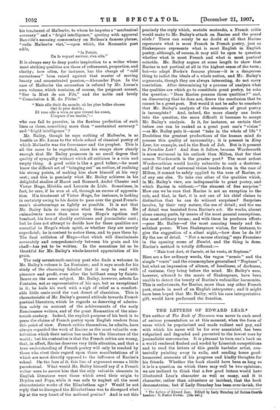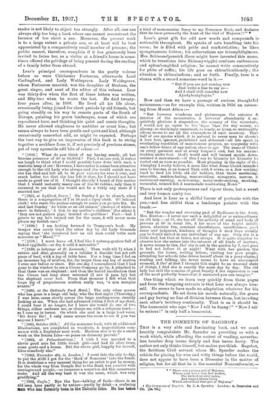THE LETTERS OF EDWARD LEAR.*
THE author of The Book of Nonsense was never in such need of serious presentation as at this moment, when the form of verse which be popularised and made radiant and gay, and with which his name will be for ever associated, has been vulgarised and degraded and perverted to the lowest uses by journalistic mercenaries. It is pleasant to turn one's back on a world rendered flushed and sordid by Limerickseompetitions and to read the letters of this gentle bachelor artist, con- tentedly painting away in exile, and sending home good- humoured accounts of his progress and kindly thoughts for his friends. Whether the book should have been as long as it is is a question on which there may well be two opinions ; we are inclined to think that a few good letters would have illustrated Lear's character as well as many, and it is character, rather than adventure or incident, that the book demonstrates; but if Lady Strachey has been over-lavish, the * The Letters of Edward Lear. Edited by Lady Strachey (or Sutton CM* London: T. Fisher 1:raisin. [15s. net.] reader is not likely to object too strongly. After all, one can always skip too long a book where one cannot reconstruct the lacunae of too short a one. Moreover, the present work is to a large extent a private one, or at least will be best appreciated by a comparatively small number of persons; the public cannot, therefore, complain if it has generously been invited to listen too, as a visitor at a friend's house is some- times offered the privilege of being present during the reading of a family letter from abroad.
Lear's principal correspondents in the portly volume before us were Chichester Fortescue, afterwards Lord Carlingford, and Lady Waldegrave. Lady Waldegrave, whom Fortescue married, was the daughter of Brabam, the great singer, and aunt of the editor of this volume. Lear was thirty-five when the first of these letters was written, and fifty-two when he wrote the last. He died twenty- four years after, in 1888. He lived all his life alone, occasionally being joined for short periods by old friends, but going steadily on his way in remote parts of the South of Europe, painting his grave landscapes, some of which are reproduced here, and thinking his quiet and comic thoughts. He never allowed singleness to embitter or crust him ; but seems always to have been gentle and quiet and kind, although occasionally somewhat odd, as might be expected. Perhaps the best way to give an impression of this book is to string together a necklace from it, if not precisely of precious stones, yet of very agreeable odd bits of colour :— " [1849.] What do you think of my having nearly, all but become possessor of 40 or 50,000X ? Fact, I assure you, it makes me laugh to think what I could possibly have done with such a statistic heap of ore ! However, I have never it seems been attentive enough, to the old •Lady who always said she would enrich me, so she has died and.left all to 30 poor widows for ever & ever, and much better too that she has left it thus, for I should not have made as good use of it. I thought directly I heard of this matter that I would instantly marry one of the 30 riddles, only then it occurred to me that she would not be .a viddy any more if I married her."
" [1851, at Lydford, Devon.] On Sunday I go to church, when there is a congregation of '7 or 10 and a tipsy clerk. 0! beloved clerk ! who reads the psalms enough to make you go into fits. He said last Sunday As white as an old salmon' (instead of white as snow in Salmon), A lion to my mother's children' (for alien) & they are not guinea pigs,' instead of—guiltless ! Fact :—but I grieve to say he's turned out for the same, & will never more please my foolish ears."
" [1856.] I am looking forward to Tennyson's book. My temper was sorely tried the other day by old Lady Ormonde saying that she wondered how an old man could write such nonsense as "Matall"'"
" [1858.] I must leave off, I feel like 5 nutmeg-graters full of baked- eggshells—so dry & cold & miserable."
" [1859, in lodgings at St. Leonards.] Then walk till 7* when I return and dine, generally on a tabular & durable but not soft piece• of beef, with a jug of table beer. For a long time I fed on an immense leg of mutton, far, far larger than any leg of mutton I ever saw before or since. But one day I remembered that I had gone to the window to see a Circus Company go by, & attached to that there was an elephant : and then the horrid recollection that the Circus had long since returned (I saw it pass by) but the elephant never had. From that moment I felt what that large leg of preposterous mutton really was, e non mangiar avante.'
" [1860, at the Oatlands Park Hotel.] The only other person who has gone is a large old lady, who the first night (Thursday,) I was here, came slowly across the large reading-room, steadily looking at me. When she had advanced within 3 feet of my chair, I could bear it no longer, for I knew she would do one of two things, either embrace me, or charge me with a religious tract,— so I rose up in terror. On which she said in a large loud voice, Sit down Sir! I only came across the room to see if you was anyone I knew.'" " [1861, October 28th.] AU the nonsense book, with 42 additional illustrations, are completed as woodcuts, & negrotiations com- mence with a Buplisher next week. Maclean also is to do a small work on the Ionian Isles—so pease an darmony prevale."
" [1862, at Pakeokastrizza.] I wish I was married to a clever good nice fat little Greek girl—and had 25 olive trees, some goats and a house. But the above girl, happily for herself, likes somebody else."
" 1862, November 4th, in London.] I went into the city to-day, to put the £125 I got for the Book of Nonsense' into the funds. It.is doubtless a very unusual thing for an artist to put by money, for the whole way from Temple Bar to the Bank was crowded with carriages and people,—so immense a sensation did this occurrence make. And all the way back it was the same, which was very gratifying." " [1863, Corfu.] Bye the bye—talking of fools—there is an old man here partly so by nature—partly by drink—a seafaring an who has formerly been in the Balearic Isles. He has taken a kind of monomaniac fancy to my Nonsense Book, and declares that he knew personally the Aunt of the Girl of Majorca! ! " •
Lear's great gift for odd new words and compounds is noticeable throughout. He speaks of cats bumbling into his room; he is filled with pride and conflatulation ; he likes spongetaneous letters ; his ozbervations are triumphiliginous. Mrs. Schiinmelpennick (Lear might have invented this name, which he translates into Skimmywiggle) confuses enthusiasm and splombonglified religion ; he cannot write consecutively for phits of coffin ; his life goes on sklombionbionsly ; the situation is sklimzimfiona ; and so forth. Finally, here is a stanza with a record nonsense-word in it :— " But if you are not coming now Just write a line to say so— And I shall still consider how Ajoskybosky bay so."
Now and then we have a passage of curious thoughtful seriousness,—as for example this, written in 1856 on return- ing from Mount Athos :—
" But however wondrous and picturesque the exterior & interior of the monasteries, & however abundantly & ex- quisitely glorious & stupendous the scenery of the mountain, I would not go again to the 'Awn, 'Opos for any money, so gloomy, sa shockingly unnatural, so lonely, so lying,so unatonably odious seems to me all the atmosphere of such monkery. That half of our species which it is natural to every man to cherieb. & love best, ignored, prohibitei and abhorred—all life spent in everlasting repetition of monotonous prayers, no sympathy with one's fellow-beans of any nation, class or age. The name of Christ on every garment and at every tongue's end, but. his maxima trodden under foot. God's world and will turned upside down, maimed & caricatured :—if this I say be Xtianity let Xtinnity be rooted out as soon as possible. More pleasing in the sight of the Almighty I really believe, & more like what Jesus Christ intended man to become, is an honest Turk with 6 wives, or a Jew working hard to feed his little old clo' babbles, than these muttering. miserable, mutton-hating, man-avoiding, misogynie, morose, & merriment-marring, monotoning, many-mule-making, mocking, mournful, minced fish & marmalade masticating Mona."
There is not only grotesqueness and vigour there, but a sweet and very human sanity too.
And here is Lear as a skilful limner of portraits with the pen,—not less skilful than a landscape painter with the brush :— " But the wonder and crowning part of Redhouse is the Aunt, Mrs. Ruxton :—I never saw such a delightful or so extraordinary an old lady :—at 85, she has all the activity of mind and body of persons at 60 in usual life, & far more of the bright intelli- gence, absolute fun, constant cheerfulness, unselfishness, good sense and judgment, kindness of thought & deed than usually can be found united in any individual of any age. Only she is a little deaf, but that at times, not always. It is quite singular to observe bow she enters into the interest of all kinds of matters, & never seems to tire, tho' she is out in the garden by 7, and• goes to bed not before 11 at night! What with her garden, the grounds, the house, writing letters, visiting her poor people, attending her schools (she drives herself about in a pony-chaise,) reading and talking, she never seems to have an unoccupied moment, & tho' at first I thought this might be an unusual state of things, I find she is exactly the same day by day. The old lady has still the remains of great beauty & her expression is one of the most perfectly benevolent & animated you can. imagine."
One thing which we learn very quickly from these pages and from the foregoing extracts is that Lear was always him- self. He seems to have made no adaptation whatever for his correspondents. He set down his moods naturally, the grave and gay having no line of division between them, but invading each other's territory continually. That is as it should be. The humourist who says "Now I will be funny!" "Now I will be serious !" is only half a humourist.















































 Previous page
Previous page